The Secret Codes of the Mahabharata You Haven’t Discovered Yet
Nikita Kanyal | Jan 08, 2025, 22:21 IST
( Image credit : Timeslife )
The Mahabharata constitutes more than just an ancient epic—it serves as a rich reservoir of concealed wisdom and cloaked messages awaiting discovery. Ranging from the life teachings derived from the Chakravyuha to Krishna’s transformative guidance, these undisclosed enigmas provide profound perspective for addressing contemporary dilemmas. Immerse yourself in the overlooked realities of betrayal, ambition, love, and dharma, and unveil how this enduring narrative unlocks the secrets to navigating the intricacies of present-day existence.
The Mahabharata—an everlasting epic filled with conflicts, gods, and the battle for righteousness—has been studied for centuries by scholars and storytellers. However, hidden beneath its surface are secret codes, subtle messages, and layers of understanding that many people overlook. These “codes” are not simply leftovers of ancient Indian wisdom; they are lessons that resonate in the chaotic present, making the Mahabharata increasingly relevant today.
Code 1: The Chakravyuha and Life’s Labyrinths
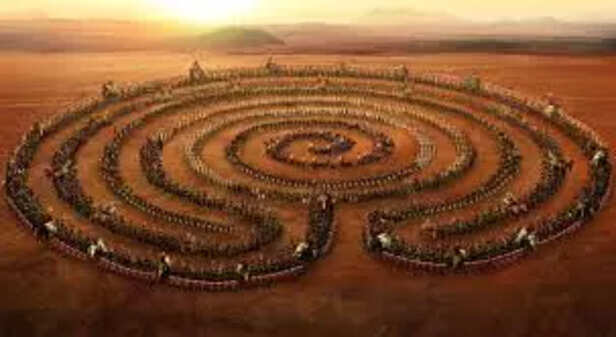
Remember Abhimanyu, the youthful warrior who sadly perished in the Chakravyuha? Many regard his tale as one of youthful bravery and untimely demise. However, the Chakravyuha is not merely a military formation—it symbolizes life itself.
We all embark on life (the Chakravyuha) with incomplete understanding, much like Abhimanyu. We are aware of how to begin, take chances, and engage in initial struggles. But do we always comprehend how to extricate ourselves from toxic relationships, unfulfilling jobs, or harmful habits? The message here is evident: preparation entails not only learning how to enter a scenario but also excelling in the art of exit strategies.
Code 2: The Dice Game and the Price of Overconfidence
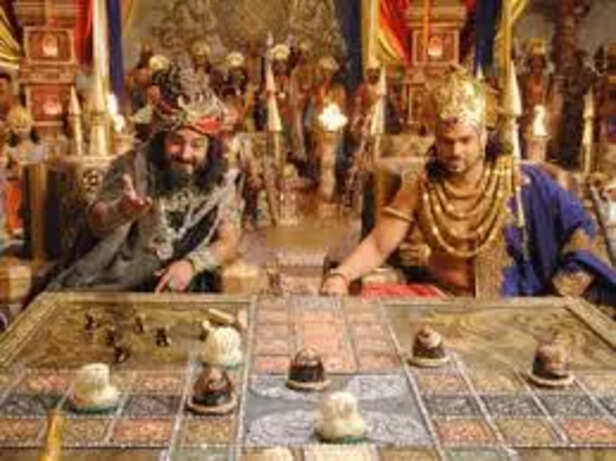
The notorious dice game involving Yudhishthira and Shakuni serves not only as a gambling tale—it also offers a powerful cautionary lesson regarding misplaced faith and overconfidence. Yudhishthira, recognized for his steadfast commitment to dharma, was so assured of his ethical supremacy that he failed to recognize Shakuni’s shrewdness.
How often have you placed your trust in someone, convinced that they wouldn’t deceive you, only to discover they manipulated you effortlessly? The dice game imparts an essential lesson relevant to today: ethics are crucial, but so is discernment. Being virtuous does not equate to being gullible.
Code 3: Draupadi’s Five Husbands and the Complexity of Choices
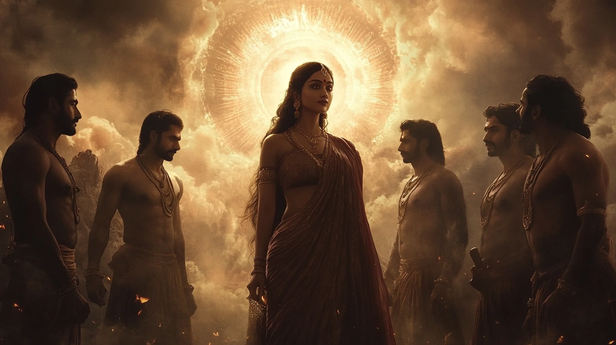
Draupadi, one of the most fascinating figures in the Mahabharata, wed five men—the Pandavas. Initially, this may appear to be an odd arrangement, but it serves as a deep symbol for comprehending human wants and relationships.
Each Pandava embodies a distinct trait—righteousness (Yudhishthira), strength (Bhima), skill (Arjuna), charm (Nakula), and intelligence (Sahadeva). Draupadi didn’t “select” one; she accepted them all, signifying that humans aren’t one-dimensional. We yearn for various qualities in our relationships, careers, and lives.
The hidden message here? Life isn’t about conforming to a single thing—it’s about harmonizing various aspects and learning to navigate complexity.
Code 4: Krishna’s Role and the Power of Perspective
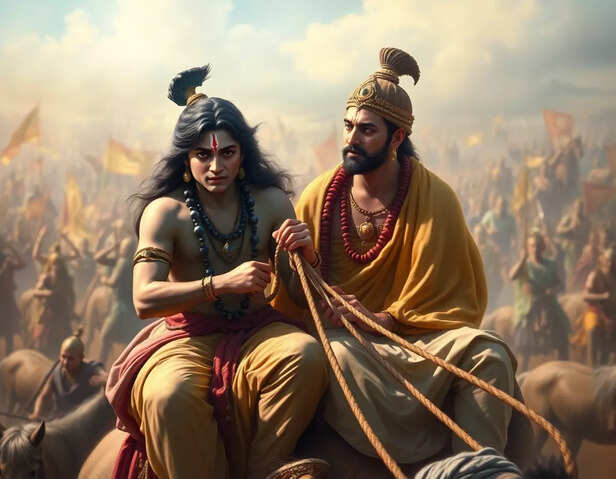
Krishna’s role in the Mahabharata is one of the most mysterious and debated aspects of the epic. Is he a god? A strategist? A friend? The answer lies in your perspective.
Krishna doesn’t fight in the war; he merely guides. This reflects the secret code of inner consciousness. In life, your “Krishna” is your intuition the quiet voice that guides you, even when chaos surrounds you. He teaches us to detach from outcomes, focus on our duties, and trust the process.
The Bhagavad Gita, delivered by Krishna to Arjuna, isn’t just a spiritual text—it’s a life manual. The code here? Your biggest battles aren’t external; they’re within. And your greatest ally is your own clarity of thought.
Code 5: The Curse of Karna and the Weight of Injustice
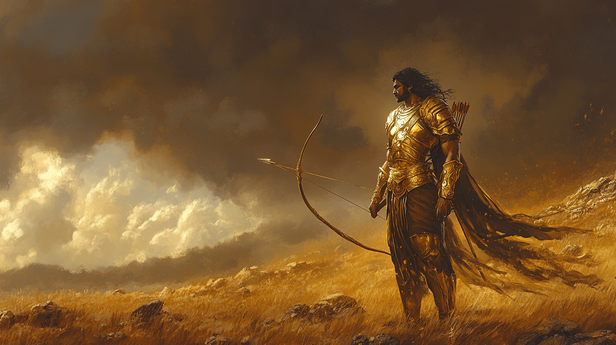
Karna, the tragic hero, experienced a life filled with rejection and injustice. Born to Kunti yet abandoned at birth, he was raised yearning for acceptance and dedicated his life to proving his worth. However, in spite of his unparalleled skills and generosity, he encountered ongoing betrayal—from his mother, his rightful heritage, and even fate itself.
Karna’s narrative serves as a metaphor for the contemporary challenges faced by the underdog. How frequently do we experience feelings of being overlooked, undervalued, or trapped in a system that appears rigged against us? His tale serves as a reminder that although life may not always seem equitable, our reactions shape our legacy. Karna’s dignity, loyalty, and generosity in the face of hardship motivate us to transcend our circumstances.
Code 6: The Mahabharata as a Mirror
Above all, the Mahabharata is a mirror. It reflects our flaws, virtues, and struggles. Each character is a piece of us:
The indecisiveness of Arjuna.
The ambition of Duryodhana.
The devotion of Bhishma.
The vengeance of Draupadi.
The secret code? There’s no single hero or villain in the Mahabharata. Just like in life, everyone is shades of gray. Understanding this is key to unlocking compassion—for yourself and others.
In a society fixated on dualities—good versus bad, success versus failure—the Mahabharata provides a complex viewpoint. It doesn’t dictate what is right or wrong; it encourages you to ponder, contemplate, and uncover your truth.
These hidden messages are not merely ancient knowledge; they are valuable life lessons concealed in plain sight. Whether you are making a tough choice, coping with betrayal, or merely seeking to understand your journey, the Mahabharata has a message for you.
Therefore, the next time you overhear someone trivialize the Mahabharata as “just another myth,” keep this in mind: it is not simply a narrative. It is a map , a guide to interpreting the maze of life, abundant with hidden messages waiting to be uncovered.
Code 1: The Chakravyuha and Life’s Labyrinths

Life isn’t just about entering the battle, but knowing when to exit
( Image credit : Timeslife )
Remember Abhimanyu, the youthful warrior who sadly perished in the Chakravyuha? Many regard his tale as one of youthful bravery and untimely demise. However, the Chakravyuha is not merely a military formation—it symbolizes life itself.
We all embark on life (the Chakravyuha) with incomplete understanding, much like Abhimanyu. We are aware of how to begin, take chances, and engage in initial struggles. But do we always comprehend how to extricate ourselves from toxic relationships, unfulfilling jobs, or harmful habits? The message here is evident: preparation entails not only learning how to enter a scenario but also excelling in the art of exit strategies.
Code 2: The Dice Game and the Price of Overconfidence

Virtue alone isn’t enough; discernment is key to avoiding manipulation
( Image credit : Timeslife )
The notorious dice game involving Yudhishthira and Shakuni serves not only as a gambling tale—it also offers a powerful cautionary lesson regarding misplaced faith and overconfidence. Yudhishthira, recognized for his steadfast commitment to dharma, was so assured of his ethical supremacy that he failed to recognize Shakuni’s shrewdness.
How often have you placed your trust in someone, convinced that they wouldn’t deceive you, only to discover they manipulated you effortlessly? The dice game imparts an essential lesson relevant to today: ethics are crucial, but so is discernment. Being virtuous does not equate to being gullible.
Code 3: Draupadi’s Five Husbands and the Complexity of Choices

Life is about embracing the many dimensions that make us whole
( Image credit : Timeslife )
Draupadi, one of the most fascinating figures in the Mahabharata, wed five men—the Pandavas. Initially, this may appear to be an odd arrangement, but it serves as a deep symbol for comprehending human wants and relationships.
Each Pandava embodies a distinct trait—righteousness (Yudhishthira), strength (Bhima), skill (Arjuna), charm (Nakula), and intelligence (Sahadeva). Draupadi didn’t “select” one; she accepted them all, signifying that humans aren’t one-dimensional. We yearn for various qualities in our relationships, careers, and lives.
The hidden message here? Life isn’t about conforming to a single thing—it’s about harmonizing various aspects and learning to navigate complexity.
Code 4: Krishna’s Role and the Power of Perspective

Krishna’s Wisdom: Guiding Through Chaos
( Image credit : Timeslife )
Krishna’s role in the Mahabharata is one of the most mysterious and debated aspects of the epic. Is he a god? A strategist? A friend? The answer lies in your perspective.
Krishna doesn’t fight in the war; he merely guides. This reflects the secret code of inner consciousness. In life, your “Krishna” is your intuition the quiet voice that guides you, even when chaos surrounds you. He teaches us to detach from outcomes, focus on our duties, and trust the process.
The Bhagavad Gita, delivered by Krishna to Arjuna, isn’t just a spiritual text—it’s a life manual. The code here? Your biggest battles aren’t external; they’re within. And your greatest ally is your own clarity of thought.
Code 5: The Curse of Karna and the Weight of Injustice

Heroic Legacy of Resilience
( Image credit : Timeslife )
Karna, the tragic hero, experienced a life filled with rejection and injustice. Born to Kunti yet abandoned at birth, he was raised yearning for acceptance and dedicated his life to proving his worth. However, in spite of his unparalleled skills and generosity, he encountered ongoing betrayal—from his mother, his rightful heritage, and even fate itself.
Karna’s narrative serves as a metaphor for the contemporary challenges faced by the underdog. How frequently do we experience feelings of being overlooked, undervalued, or trapped in a system that appears rigged against us? His tale serves as a reminder that although life may not always seem equitable, our reactions shape our legacy. Karna’s dignity, loyalty, and generosity in the face of hardship motivate us to transcend our circumstances.
Code 6: The Mahabharata as a Mirror
The indecisiveness of Arjuna.
The ambition of Duryodhana.
The devotion of Bhishma.
The vengeance of Draupadi.
The secret code? There’s no single hero or villain in the Mahabharata. Just like in life, everyone is shades of gray. Understanding this is key to unlocking compassion—for yourself and others.
Why These Codes Matter Today
These hidden messages are not merely ancient knowledge; they are valuable life lessons concealed in plain sight. Whether you are making a tough choice, coping with betrayal, or merely seeking to understand your journey, the Mahabharata has a message for you.
Therefore, the next time you overhear someone trivialize the Mahabharata as “just another myth,” keep this in mind: it is not simply a narrative. It is a map , a guide to interpreting the maze of life, abundant with hidden messages waiting to be uncovered.
